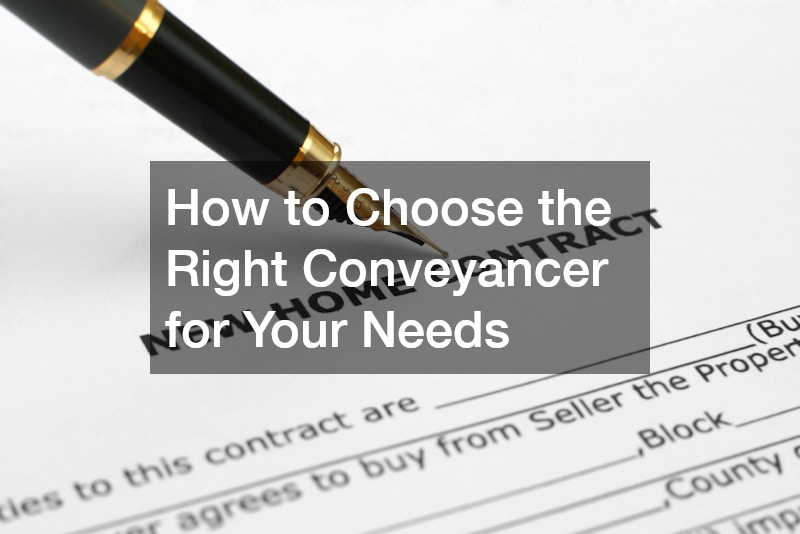When buying or selling property in Australia, choosing the right conveyancer is one of the most important decisions you’ll make. Conveyancing is the legal process of transferring property ownership from one person to another and a conveyancer ensures this process runs smoothly, legally and efficiently.
Whether you’re a first home buyer or a seasoned investor, the quality of your conveyancer can make all the difference to your property transaction. Understanding how to choose the right professional for your needs can help you avoid costly errors and stressful delays.
Understand What a Conveyancer Does
A conveyancer specialises in the legal aspects of property transactions. Their role includes preparing and reviewing contracts, conducting property searches, liaising with banks and government departments and ensuring all legal documents are in order. While solicitors can also perform conveyancing work, many people choose a licensed conveyancer due to their focused expertise and typically lower fees. However, not all conveyancers offer the same level of service, so it’s crucial to assess your options thoroughly.
Consider Their Experience & Qualifications
When evaluating a conveyancer, experience should be a top priority. Look for a licensed professional who has handled transactions similar to yours. For instance, buying a strata property can be more complex than a freestanding home due to additional rules and paperwork, so a conveyancer with specific experience in strata titles would be better equipped to handle your purchase. A knowledgeable conveyancer will foresee potential complications and proactively address them, helping your transaction proceed without unexpected obstacles. Make sure they are fully qualified, registered in your state or territory and have professional indemnity insurance, which is mandatory for practising conveyancers in Australia.
Look at Local Knowledge
Local expertise can significantly benefit your transaction. A conveyancer familiar with your area will have insights into regional regulations, council requirements and property market conditions that may affect your sale or purchase. For example, if you’re buying a home in Victoria, you’ll want a conveyancer who understands the intricacies of Section 32 Vendor Statements and the requirements of the Sale of Land Act 1962. Someone local is also more likely to have strong relationships with local real estate agents, lenders and inspectors, which can streamline the entire process and minimise delays.
Assess Their Communication Style
Clear and responsive communication is a non-negotiable trait when choosing a conveyancer. Property transactions involve strict deadlines and any miscommunication can lead to costly delays or penalties. When you first contact a potential conveyancer, note how quickly they respond and how well they explain complex terms. A good professional should be approachable and willing to keep you informed at every stage. Ask them how they plan to communicate with you—whether by phone, email or through an online portal—and how often they provide updates. The best conveyancer will ensure you always know what’s happening with your transaction and what’s required of you.
Compare Costs Transparently
While cost shouldn’t be the only factor in your decision, it is still important to understand the fees involved. Reputable conveyancers will offer a clear breakdown of their costs, including professional fees, search fees and any government charges. Be cautious of unusually low quotes, which may exclude essential services and result in hidden fees later. It’s also wise to clarify what’s included in the quoted price. Some conveyancers offer fixed-fee services, while others charge based on the complexity of the transaction. Comparing quotes from several providers will give you a clearer picture of what’s reasonable and help you avoid any unpleasant surprises.
Check Online Reviews & Recommendations
Word of mouth remains one of the most reliable ways to find a quality conveyancer. Ask friends, family or your real estate agent for recommendations based on their experiences. Online reviews and testimonials can also offer insights into the level of service and professionalism you can expect. Look for consistent positive feedback and how the business responds to complaints. A well-reviewed conveyancer with a reputation for thoroughness, punctuality and customer service is more likely to handle your transaction with the care it deserves.
Ask the Right Questions
Before committing to a conveyancer, don’t be afraid to ask questions. Enquire about their typical turnaround times, how many cases they handle at once and whether they’ve dealt with properties similar to yours. Find out if the person you’re speaking with will be handling your matter directly or if it will be delegated to junior staff. These details will give you a better sense of how much attention your file will receive. A trustworthy professional will be happy to answer your questions and provide reassurance about their approach and processes.
Ensure You Feel Comfortable
Ultimately, you should feel confident and comfortable with the person you choose to handle your conveyancing. This person will be managing a vital legal process on your behalf and you’ll need to trust their judgement and reliability. If something feels off during your initial discussions—whether it’s a lack of professionalism, vague answers or poor communication—it’s wise to consider other options. The right conveyancer will not only guide you through the legalities but also reduce your stress and give you peace of mind.
Choosing the right conveyancer is a key step in any property transaction. By doing your research, asking the right questions and evaluating experience, communication and local knowledge, you’ll be in a strong position to make an informed choice. A reliable, professional conveyancer can mean the difference between a smooth transaction and one riddled with complications. Investing the time to find the right fit ensures your property dealings are in safe hands—allowing you to focus on your next exciting chapter with confidence.
.

